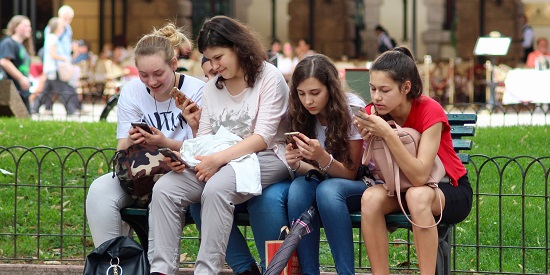'Cluey' Aussie teens reject unrealistic body standards on social media
Media release
Teen girls confronted by unrealistic body standards on social media are tuning out in droves in search of more positive online content, research shows.
The Deakin University study of teens' use of social media platforms and health and fitness apps revealed girls aged 15 to 17 are more inclined to unfollow influencers they feel are unrelatable.
They also prefer information that is factual and produced by credible sources over accounts that feature touched-up images or unsubstantiated claims.
Project lead Dr Kate Parker of Deakin's Institute for Physical Activity and Nutrition (IPAN) said the findings, published this month in the journal BMC Public Health, were a "wake up call" for online content creators.
Today's teens were sick of being body-shamed and wanted online health and fitness apps with age-appropriate content that suited their fitness level and appealed to their interests, she said.
They also craved information that was motivational and inspirational instead of calorie counters and prescriptive, punishing fitness regimes.
"What our research shows us is where girls may once have been drawn to highly stylised or photo-shopped images of super fit or very thin young women, they are now aware that these images are likely to have been edited or are actually unhealthy," Dr Parker said.
Co-IPAN researcher Dr Ana Maria Contardo Ayala said: "Girls overwhelmingly told us they were dissatisfied with the limited range of body types promoted online and they wanted alternatives to support their psychological safety and a positive body image.
"They also want online spaces where they can connect with other girls their age who have similar health interests and where they’re not sold fake promises that if they embark on a restrictive diet and strict workout routine, they will achieve certain results."
The study, which surveyed 336 Australian teenage girls aged 15 to 17 and included 29 interviews, was conducted to establish which social media platforms and health apps are most popular among teens and why.
Centre for Sport Research Associate Professor Kim Toffoletti, who assisted with the study, said Instagram, TikTok and YouTube were among the most popular platforms for teens.
But she said it was interesting to note they used a combination of different apps to meet their health and fitness goals.
This showed not one app or online platform currently catered to teens' complete health and wellness needs, and there was scope for health organisations and content producers to fill the void.
"Girls today take a more holistic approach to their health and wellness, and no two girls use exactly the same apps," Associate Professor Toffoletti said.
"Some apps are used to manage meal plans and sleep patterns, while others are used to access workouts or promote better mental health."
Dr Contardo Ayala said it was hoped content creators, influencers and social media platforms would harness the findings of the Deakin study to pivot their offerings to better service teen girls’ health and wellness needs.
This would encourage more teens to use health and fitness online tools to improve their mental and physical health.
"As digital natives, teen girls today are more cluey about the online content they engage with and are more discerning about the content they want to see in their social media feeds," Dr Contardo Ayala said.
"It is hoped that by using our findings, content creators and social media platforms can improve their offering for girls in the 15 to 17-year-old age group, who tend to be quite sedentary, and encourage them to lead healthier, happier lifestyles."
The study, Understanding Australian adolescent girls' use of digital technologies for healthy lifestyle purposes: a mixed-methods study, can be found here.

